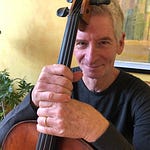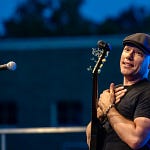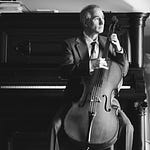012 Trevor P. Allen

Photo supplied by Trevor Allen
Transcript:
Trevor Allen: I say bass players never really chose the bass. The bass has been around for thousands of years. The bass chose us. What I liken the role of a bass player to in the music is like... we are a shag carpet. Big, plush, and we're able to let a baby, that being the melody, just romp and roll all over us and do what they want, knowing that they are protected, and they are nurtured.
Trevor Exter: Welcome to Play It Like It's Music! Shop talk with working players, condensed for the quick mind of a practicing musician. My friends, today we hear from a true keeper of the flame, Mr. Trevor P. Allen. From the trenches of the New York club scene to bandstands all over the world, this guy delivers on the bass.
But Trevor's more than a bass player. He's also a band leader in his own right. He runs the show every single Tuesday at Cafe Wha?, and he tours with people like Roy Ayers and Freddie Jackson. He's the real deal, and he was kind enough to talk about style, spirituality, versatility, work ethic. The guy is a true musical tradesman. I went to talk to him at his place in Brooklyn.
...
TA: Hey, what's up?
TE: Good to see you. How you doing?
TA: How you doing? Good.
TE: Good to see you, man.
TA: Just take your shoes off when you get in.
TE: Sure.
TA: My name is Trevor Allen, bass guitar.
TE: You play a variety of bass guitars, but no upright?
TA: I used to play upright more in college. I was in the Latin jazz band, so I played there. But ever since then, ever since I've been working, it's been mostly electric.
TE: Right on. Why do you play music?
TA: Wow. I play music for the ... initially, for the way it makes me feel and the sense of security, and just sense of harmony it brings my spirit. I think once you're able to attain a certain level of, be it mastery or competency, whatever, you're starting to be able to see how it affects others and their spirits.
I've been on gigs or I've spoken with other musicians that have had such amazing responses from audiences that have said anything from, "Oh, you guys made my day," to the other extent of, "You know, before I came here to this club to listen to you guys, I was going to kill myself." When you hear that kind of thing, you just really understand the depth of where music can take you.
...
TA: There's just certain frequencies, or just different nuances, or things happening within the music that vibrate through us.
TE: Where'd you go to college?
TA: City College of New York.
TE: Right on. So you're from New York.
TA: Well, raised here. I was actually born in London, England. Family moved here when I was 5, so I've been more of a USA person. I mean, the accent's totally gone and everything, but ...
TE: You make it back there?
TA: Yeah, quite a few times on tours and stuff. I was just there last December, actually. Got to see some family, hang out.
TE: And you're one of those guys who's working a lot.
TA: I am very fortunate to be known very well around New York and surrounding areas, so there always seems to be some thing or need for a good musician. And I do my best to fill the bill.
TE: Right. A professional. But when you're saying "known", we're not talking National Enquirer known. We're talking-
TA: (laughs)
TE: ... the people who know who should be called. Generally, your name is close to the top of that list.
TA: Musician circles. New York musician circles, I'm kind of well-known, yeah.
TE: That's great.
TA: And I'm really grateful and thankful for that. I think through music, also, early on, I was able to -- for me, personally -- understand that there's a greater purpose, maybe a supreme being in a sense, that kind of nurtures us and just speaks to us through a certain medium. Kind of connects us all as human beings.
TE: Do you have a specific religious background that you came up with?
TA: Well, I was raised in a Baptist church from early on, so you always had a great deal of reverence for that. In terms of my career, I would say I've always had a belief and a drive for our Lord and Savior, and that's something that's never really left me. I still work or perform in churches to this day, and it's kind of a staple for me, because it kind of grounds me musically and spiritually. There's so much to be offered in the word, and just how it applies to us in everyday life.
I think life really just boils down to adhering to certain principles, and though you may fall short, still understanding where the water mark should be.
TE: Where'd you actually start? Like, what were your first inklings of "I want to do this"?
TA: In the '70s. I'm in my early 50s now, so for me, my junior high school days were spent playing with neighborhood bands. My first instrument was actually trombone, so I was playing horn sections. Big bands with horn sections was really popular in that time. You had Earth, Wind, and Fire, Confunktion, Ohio Players. A lot of major R&B funk bands had full horn sections, so that was a really great time in terms of music.
And I learned a lot just playing in those situations, and a popular thing in my neighborhood in Brooklyn was block parties. So you'd have these bands playing for block parties. It was like freebies and stuff, but it was just the idea of the exposure, doing it and just feeling the energy of crowd interaction and playing all the popular hits of the day. And it was a great time. And that just really nurtured me to say, "This. I can do this. I can do this forever."
TE: You've been playing mostly full-time since the early '90s?
TA: Yeah, pretty much. Up until then, I was going to school. I actually first got a degree in engineering back in the '80s. Got a corporate type of job for a while, like a manufacturing supervisor at this plant, way back when manufacturing actually happened in Brooklyn, in New York in general. It was an LED computer accessories company, it was kind of ahead of its time. We worked ... I supervised a department there. And it was cool. I mean, it helped to subsidize music for me, so I was able to get whatever instruments I needed. But the heart was always with the music. But I was thankful for the opportunity to be able to support myself and my passion.
As things went on, the luster of the steady work just wasn't what it was, so I left that. And actually wanted to be around the music so bad that I think my next thing was actually ... I had a van, and I wanted to meet a lot of bands and stuff. I was actually doing moving, like furniture, household things. That led to meeting musicians that needed to have transportation to and from their gigs, so it was really cool for me, because I was able to cart a band from Point A to Point B, literally dropping them off at one point, going and doing some regular moving jobs -- moving a couch or something, taking care of that -- and then going to pick them up to bring them back. So it was just like, from a business standpoint, it was great, 'cause you were able to cover both bases.
TE: How many years was this the routine?
TA: Wow. Early on, probably about 6? 5-6 years run, yeah, and then the most traumatic thing happened. The van got stolen. I was coming out to do a moving job for a cousin, and I come out, and it's like 10:00 in the morning. I go to the spot where it is, and the van was gone.
I didn't realize it, but that was a turning point for me. So what ended up happening was I made the commitment and decision in myself to say I'm going to be a full-time musician, 'cause I kind of had no choice at that point. That was it.
TE: The van gets stolen, you're without a vehicle, but you've got a bass. You're on the subway at that point.
TA: Basically, yeah.
TE: Do you have to carry an amp?
TA: I had to carry an amp. It was ... It was an experience. Very humbling, but looking back, I wouldn't have done anything any differently, because it was just so humbling in terms of seeing yourself have to run for a train, and you had to be uptown by a certain time. It just leads you to be really appreciative of when things start to get better.
As time went on, I was able to get another vehicle, and it just made things a lot easier. I'll just never forget the first weekend I had gigs and was lined up. The gig was finished, I got in tune from the gig driving, and just took the leisurely drive, stroll, around 1:00 or 2:00 in the morning up at Times Square. And it just was the most exhilarating feeling. So I always relished in the moments leading up to my success, or my accomplishment.
TE: Right. In those early days ... We talk about having to be well-rounded musically. Rhythm players don't often get the credit they deserve, 'cause every drummer and bassist you see on whatever niche gig has probably done a million other styles of music on their way to that. Tell me about an early gig of yours where you might have been shocked at how alien that particular style felt, compared to what you were used to. Was there something like a "stepping stone" gig to being more versatile?
TA: Yeah. First thing that came to mind was, I was playing with this West African singer, and I actually got called to go on tour with him in Canada. We drove up there and did the tour for about a week, a week and a half, but the rehearsals was kind of, for me, grueling, because there was certain rhythms in the music that I was not accustomed to. I came from ... I'd say my foundation is in R&B, blues, funk. So there's almost a natural logic and rhythm and syncopation to that, and growing up in that music, hearing that music, being immersed in that music, it was second nature.
So getting with an African artist playing traditional West African music was ... It was an eye-opener for sure, because it just opened me to different contrapuntal approaches, and rhythmically it was just on another plane. The real satisfaction of the whole thing was really be able to get a grasp on it, enough so to the point of actually being offered the gig.
So we went there. It was great. And as time goes on, when you've got a sense of the gig, it just becomes second nature. And that's the most gratifying feeling for me because it's like remembering the challenge of just really trying to grasp it and memorize certain things and think ahead, and still trying to be creative inside of it all. And it just opened me up to a lot of world music in general, beyond the scope of American music.
...
Click here to support the show!
...
TE: You still do the Tuesdays?
TA: Yes.
TE: Yeah. So you still do the Tuesdays, and you have the experience of both being in a band that plays routinely for a long time, and then you also get called frequently to do something brand new. Tell me a little bit about the process of getting yourself acclimated to a style and to a group of musicians and to the sound of a band. The rest of us in the band who are not the bass player, we're usually dependent on you to kind of lead us to where that band is going, so I would love to get a little bit of a window into your approach when you're brand new in a situation, and how do you get comfortable there?
TA: First - it's really a key - just getting total immersion. What I do is I listen to the music over and over and over again, just to internalize it and unconsciously really grasp it.
The mechanics of it is never really the hurdle to me. In some instances it can be, but ultimately, it's not. I think it's just about internalizing, because I look at the fact that I was able to grasp R&B music and the foundations of what I did know by really just listening to it and enjoying it for its sake. The art of the music. So I adopted that approach to other genres, meaning just really listening to it, internalizing it, singing along, getting a sense of the melody, where it sits.
And as a bass player, I should point out, it is about the bass driving things and giving a sense of where the music should go or how it sits or the feel of it. So that's something unconsciously that I'm able to do really well. It's just so key to the whole arrangement of the music that you just have to sit in a certain place. What I liken the role of the bass player to in the music is, like ... We're the carpet, we're laid down. We are shag carpet, big and plush, and we're able to let a baby, that being a melody, just romp and roll all over us and do what they want, knowing that they are protected, and they are nurtured.
TE: What habits would you recommend someone getting established, and what would you also recommend that they avoid?
TA: It's really important to find a special time, alone time, that you know that you can block off every day, at least to start, where you can devote at least an hour to just scales and developing your sense of scales. Now, I don't really necessarily practice songs unless there's some really specific parts or whatever. I find it more beneficial at this point to just really stay with the fundamentals, in terms of scales, working intervals, and just the foundational things, chord structures, arpeggios. And just really working those things regularly.
And then when you're presented with the music, it's like there's a certain place that you're at, because you know chord-wise where you're going, and you can incorporate those things into that. It becomes easier to interject your thing when you know exactly where you are in the chord and the progression, for even, say, a basic I-VI-II-V. To be able to work yourself around the fretboard melodically doing that, and still be able to hold the bassline, the figured bassline, down.
To me, it's just something that's simpler when you've got more of a strong foundation of where your chords and structures are. For me, what I did do ... I don't know if I read, it's just another way of thinking, is just learning a lot of songs. Learning a lot of basslines, which is cool. Early on, I wasn't as rigorous about chordal structure and scales and developing those things. It was about just learning the songs. So I guess what I did do was develop a strong ear for picking up lines.
But in terms of your fundamentals, it's just ... If I had it to do again, I would be a little more conscious of the fundamentals on a regular basis. And then, enter learning songs, because ultimately, repertoire is really important, in terms of circles that you play in or just want to play in, and just knowing not only to speak the idiom, but to speak the language, the specific dialect.
TE: What should a young player just not waste their time with at all?
TA: Wow! Television. That's really it. I mean, it all serves a purpose at some point or another. Knowing the latest trap song can get you out of tight, sticky situations. Who knows? Just really get into as many styles of music as you can, and don't limit yourself to just rock, or just pop, or just jazz. All genres of music have lessons, valuable lessons, to teach. And just being able to go through the breadth of all that stuff just enlightens you that much more as a player.
And they all speak to one another in certain ways, and the combination of some of them can be awesome, and you can develop a whole 'nother style. Country funk. Have you ever heard of that? It exists! Country hip hop. That's a genre. So I just say, just be willing to learn from any and all, and don't limit yourself. That's the kiss of death, when you just think you know it all in one genre, and you're going to coast through life and your musical career.
There's always going to be a call for a great bass player with great repertoire who's very well-rounded, and just a good person. It's always good to be a good person. Always be nice. Strive to be nice. And not just fake nice. Just really get into people, 'cause understanding when you're with a band, with a group of musicians, you're kind of fellowshipping. You're actually, I feel you're sharing spirits when you're playing together. So you want to add something positive to that contribution, 'cause chances are, there's some negativity within it. So you either want to counter that or just overcome it with love.
TE: Awesome. Thank you so much.
TA: My absolute pleasure, Trev.
TE: If you live anywhere live New York, then it's worth it to go see Trevor do his magic in person at Cafe Wha? on Tuesdays. The band also plays at Groove on Mondays. I know a lot of musicians think about the clubs in Greenwich Village like going to see the Statue of Liberty of something. Like, tourists do that, right? College kids? But like I said at the top, that is where they keep the fire burning. Do yourself a favor.
Thanks to Trevor for opening up the studio at Groove-a-Toon in Brooklyn and sharing his story with us. Thanks for listening.
Play It Like It's Music is produced, recorded, edited, mixed, and hosted by me, Trevor Exter. Have a good gig, and if you like the show, tell a friend. See you next time.
...
TE: Thank you so much for listening to the show. It means everything to have your ears and support each time you pass the link to your friends, review us on the web, and help out financially. These are the players I admire the most, and as a working musician myself, I've always looking to get to know them in a deeper way, find out stuff that might help me become a better musician. I love sharing these moments with you and reading your feedback and questions at our website, playitlikeitsmusic.com, where you can browse other episodes and support the show. We are 100% listener-funded. It's how we can have the conversation we need to have in an age when we're all contending with a mutating professional landscape, jacked revenue streams, and a lot of noise out there in the culture.
These are exciting times. It's almost as if the simple act of playing an instrument is a revolutionary one. We don't draw any lines between scenes or styles, so if you haven't done it already, head over to the website and join the community. You can use PayPal or make a recurring pledge through Patreon, where we offer a selection of merch and rewards.
As always, thank you for listening, and remember to Play It Like It's Music. I'm Trevor Exter.













Share this post